Summers in Europe hit different
The annual August Exodus and how everything slows down
Last month shared a post about a key ingredient to a better life.
As I was reading, I had all these thoughts and memories surface, it felt appropriate to expand on it and share some of my own observations. I just purchased my first apartment here in Barcelona, and although that doesn’t make me a Spaniard yet, I feel my roots growing deeper.
I’ve lived here for 5 years, I know things tend to slow down in August, but this apartment purchase has been a friendly reminder of how much people in Spain (and Europe in general) value their time off. So many things are on hold and in limbo. My mortgage application is at a complete standstill. I couldn’t move things along quicker even if I wanted to.
All I can do is sit back and admire their way of life… C'est la vie…
It’s no secret that Europeans get more vacation time than Americans.
In Europe (and most developed countries), paid vacations are required by law.
But of course, the U.S. is an outlier. We’ve rightfully earned the title of No-Vacation Nation because by law, we get zero paid vacation days and zero paid holidays:
Almost a hundred years ago, economist John Maynard Keynes predicted his grandkids would work just 15 hours a week. He believed advanced societies would be wealthy enough to prioritize leisure over work. But so far, his predictions are off.
In her book The Overworked American, Juliet Schor explains how the average American puts in longer hours at work than the average medieval peasant in the 13th century.
In the United States, work is the focal point of our lives.
“What do you do?” is often the first question people ask. As if it defines who you are as a person. Even when we do manage to take a holiday, there’s an underlying pressure to answer emails and “check in” on things.
In Europe, work is this thing in the background that people do to make money and live life, but it doesn’t consume your life.
There’s a saying that rings true here: “Americans live to work, Europeans work to live”.
And during the month of August, this is more evident than ever:
It’s hot, the kids are out of school, people want to be outside, in nature, with family and friends. Air conditioning is still considered a luxury so the beaches, calas, and swimming pools are packed. They take summer vacation seriously here.
Even though we’re in high season with tourism, you’ll still see shops and restaurants with a familiar sign outside:
To paint the picture, this is a restaurant in my neighborhood called Can Majo.
It’s in a prime location, right on the beach, with heavy foot traffic and a big beautiful terrace overlooking the sea. Whenever I walk past, it’s filled with people.
But since it’s August, they’re closed for 10 days straight…
My American capitalist brain is curious to know how much “profit“ they’re missing out on. Then again, it doesn’t really matter, because they don’t care. They know more money and more stuff is not the key ingredient to a better life.
They know they can always make more money, but they can’t make more time.
I have to wonder if they feel more present and engaged each day because they get to disconnect for an extended period each year. They’re not burned out from never stopping. -
You can tell they really value their time off. They value time with friends and family. They value community and social connection. They value the slower pace of life, the siestas, the long dinners, and the sobremesas1. August is the month when they indulge in all the above.
Prioritizing what’s important
Summer vacations in Spain are not super extravagant.
The purpose is to rest, relax, and recharge. If you grew up here, you likely have a friend or relative with a family vacation home near the coast. Locals migrate out of the cities to these coastal beach towns and spend weeks at a time there. If you’re a guiri like myself and don’t have a family vacation home, you can chip in with a group of friends and rent a house or an apartment somewhere outside the city.
For my first August Exodus, my buddy Xavi organized a trip up to the Costa Brava with a group of friends. We rented a house in Figueres for a week and spent our days exploring the surrounding area.
My memories of this trip are so fond. It could be for several reasons.
I was new in Spain and this was my first Costa Brava trip. The novelty alone made it special. There was also the deepening of social connection with people close to me. Spending extended time with friends in a new location brings you closer together and creates memories you’ll later look back on with nostalgia.
And that’s the whole point of life, isn’t it?
To experience moments for which we will later feel nostalgia.
On the last day of the trip, my friend Bart and I woke up early, before the sunrise, everyone else was still sleeping. We made a coffee and sat out on the terrace trying to decide what we would do that day. Every other day we had plans, but this was a free day to hang at the house and relax by the pool. As the sun peaked over the horizon, we checked Google Maps and realized the French border was not too far. We also realized we had bikes in the garage. Our gears started turning. Bart suggested we pop over to France for a cafe and croissant.
Bike ride to France? Cafe and croissant? Say no more, let’s ride:
I look back on that day with so much nostalgia. I get goosebumps as I’m writing this.
I would go as far as saying it was one of the best days of my life.
At that point, it was the longest ride I’d ever done and it was my first time crossing into a different country by bicycle.
This August Exodus trip sparked my obsession with cycling. Soon after, I bought a bike in Barcelona and it’s been my primary mode of transport for the past four years.
Of course, I could have had this epiphany during any trip, any time of the year, but what makes August special is that almost everyone takes time off.
It’s such a deep-rooted cultural tradition, it’s not even a question, it’s just assumed that you’re taking some time off throughout the month which makes it much easier to plan these types of group activities.
And because almost EVERYONE is taking vacation collectively, there isn’t that sense of vacation envy, instead, we all get to participate in this shared experience together.
Less is more
In his 2015 documentary, Where to Invade Next, Michael Moore “invades” different countries to see what we can learn from them. In the film, they discuss the August Exodus that occurs all throughout Europe.
It’s funny, sarcastic, and alarming at the same time.
The central theme is that as Americans, we should re-evaluate our priorities around work and productivity. When this Italian couple found out that we get zero paid vacation days, they couldn’t believe it. It sounds absurd to them, because it is!
It’s been proven that cognitive rest is essential for optimal performance. So how do we expect to drive innovation and economic growth if everyone is burned out and tired all the time? Our bodies and minds need time to rest and recover. Time to disconnect from everyday life.
Not having periodic breaks throughout the year is what pushes people to the brink of the edge. It makes us question “What is it all for, why am I working so hard”.
Sometimes it helps to be reminded that less is more.
I love the way
framed it in his recent essay:You can increase your enjoyment by doing less, which is a great alternative to having more fun by spending more money.
Since moving to Spain, I’ve realized that happiness is not just having money to spend, but also having time to spend that money.
Enjoy the rest of August, until next time my friends…
<3 B
P.S. - I’m toying around with some ideas and would love your feedback.
Have you ever considered pressing the reset button on life?
Or have you ever thought of moving to another country, but not sure where to start or what the first steps might look like?
If this sounds like something you’d be interested in exploring, I encourage you to take dos minutos to fill out this quick survey and I’ll be in touch.
P.P.S. - Please consider hitting the ❤️ if you enjoyed reading, it helps others find my work.
There is no equivalent word in English, though the concept is simple: sobremesa is the time you spend at the table after you’ve finished eating. In Spain the purpose of going out for lunch isn’t just eating, it’s catching up with friends or family, telling stories, and laughing away the stress caused by things that, with a little perspective, you come to realize don’t matter anyway. If all you want is food, you might as well stay at home and order in.






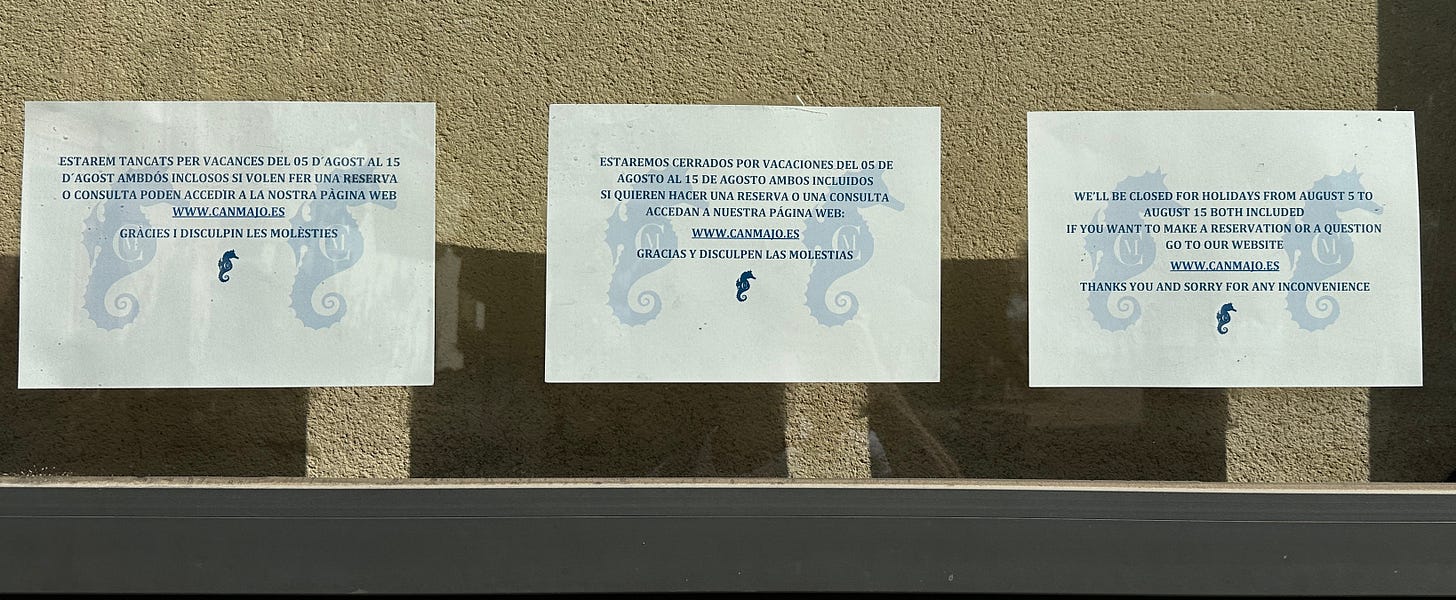
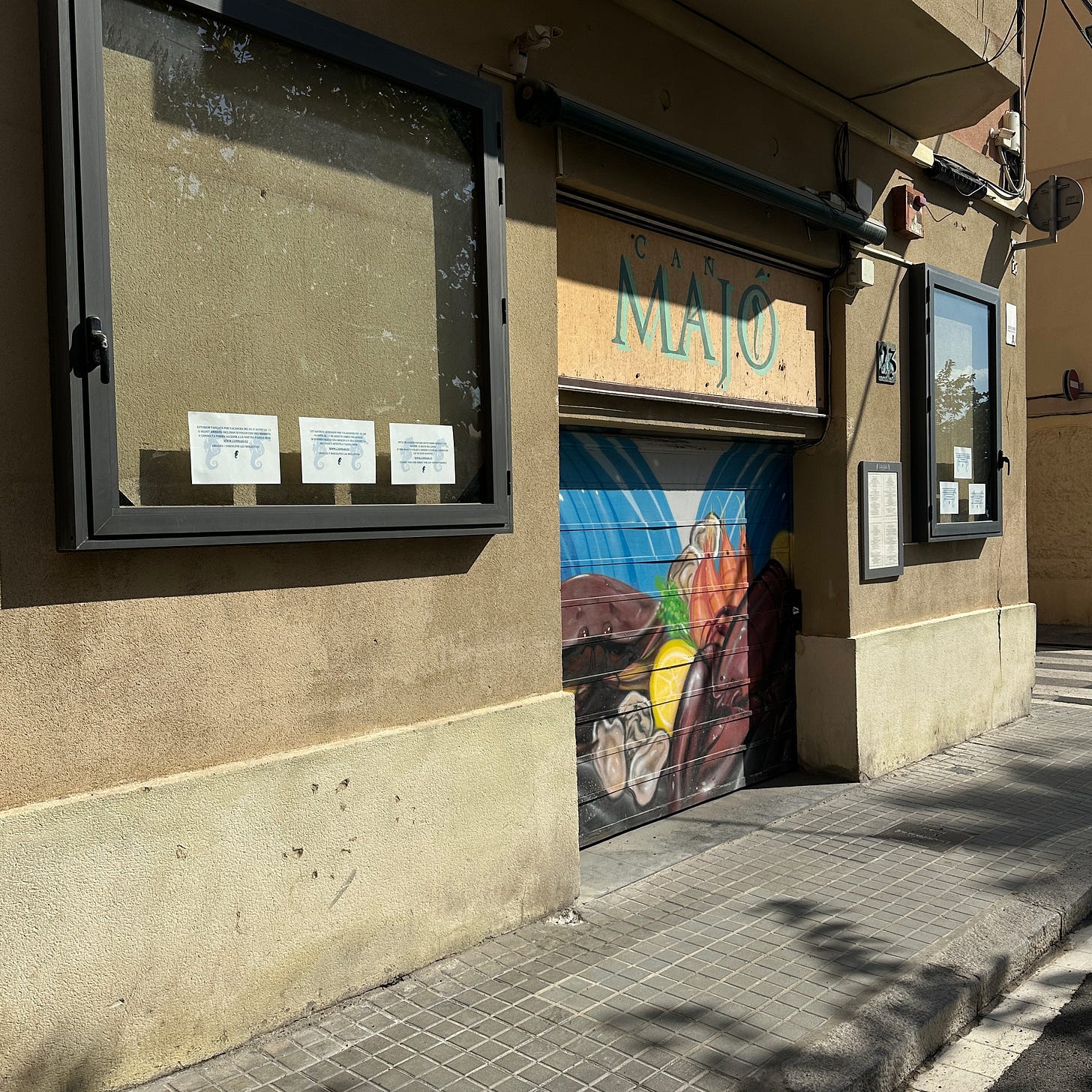
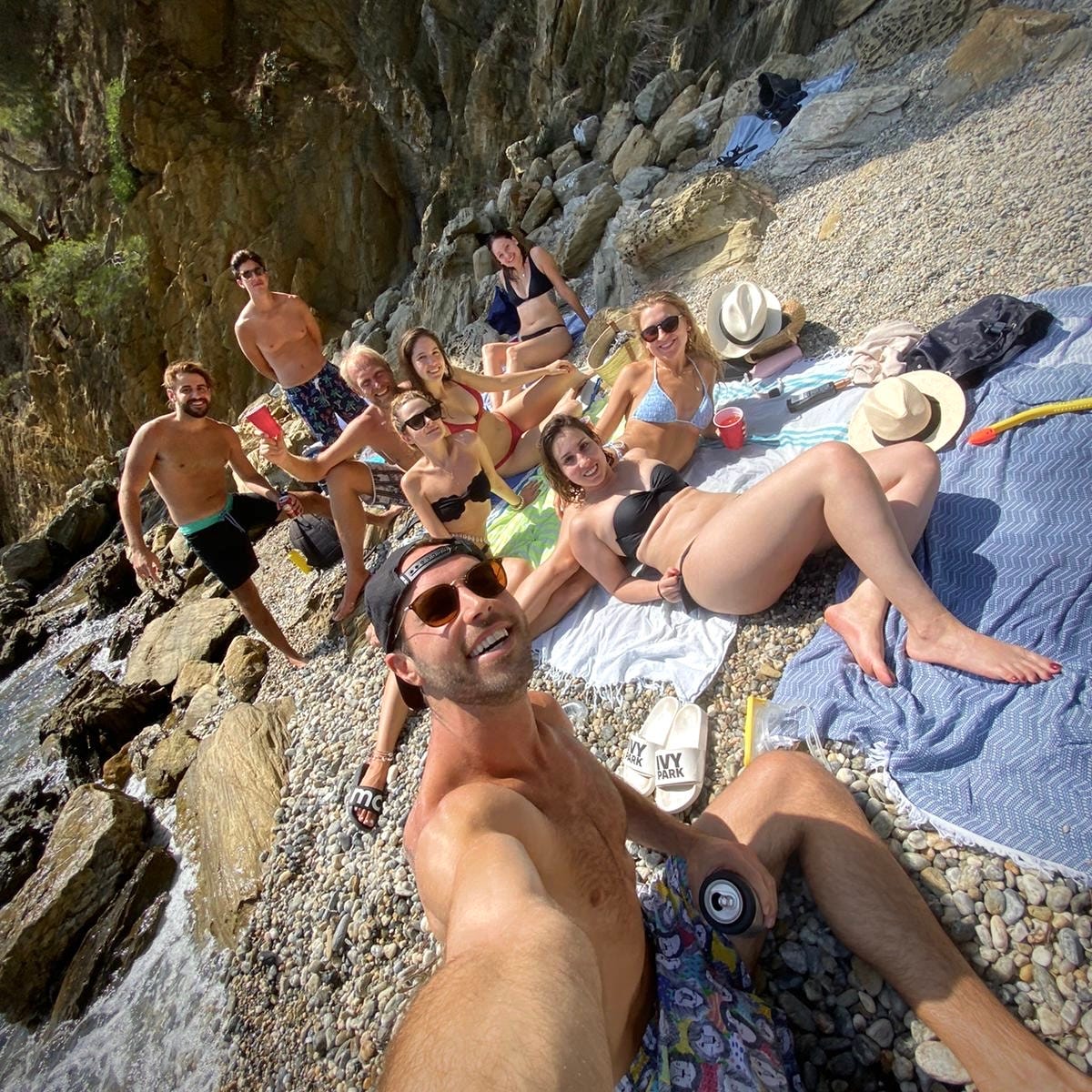
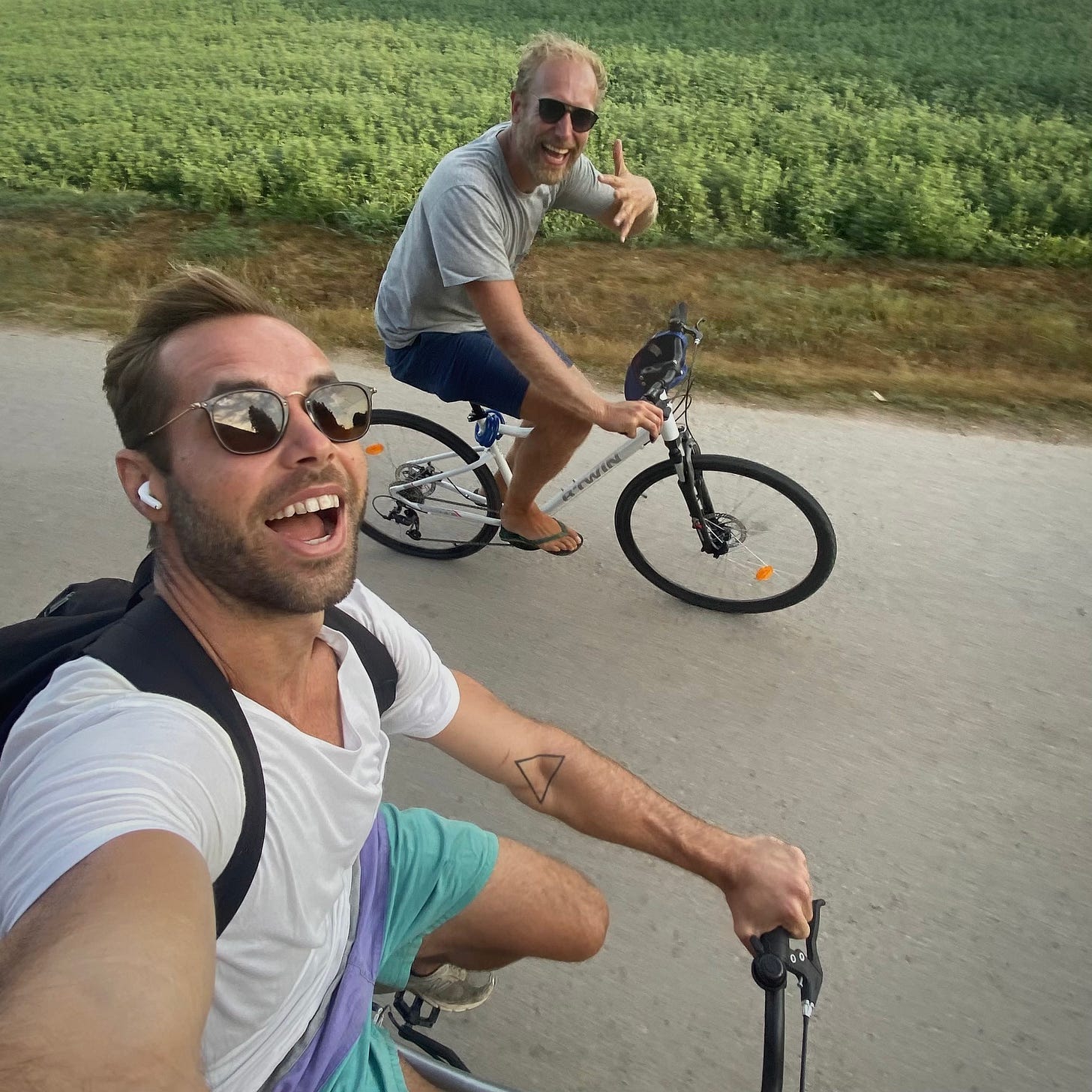
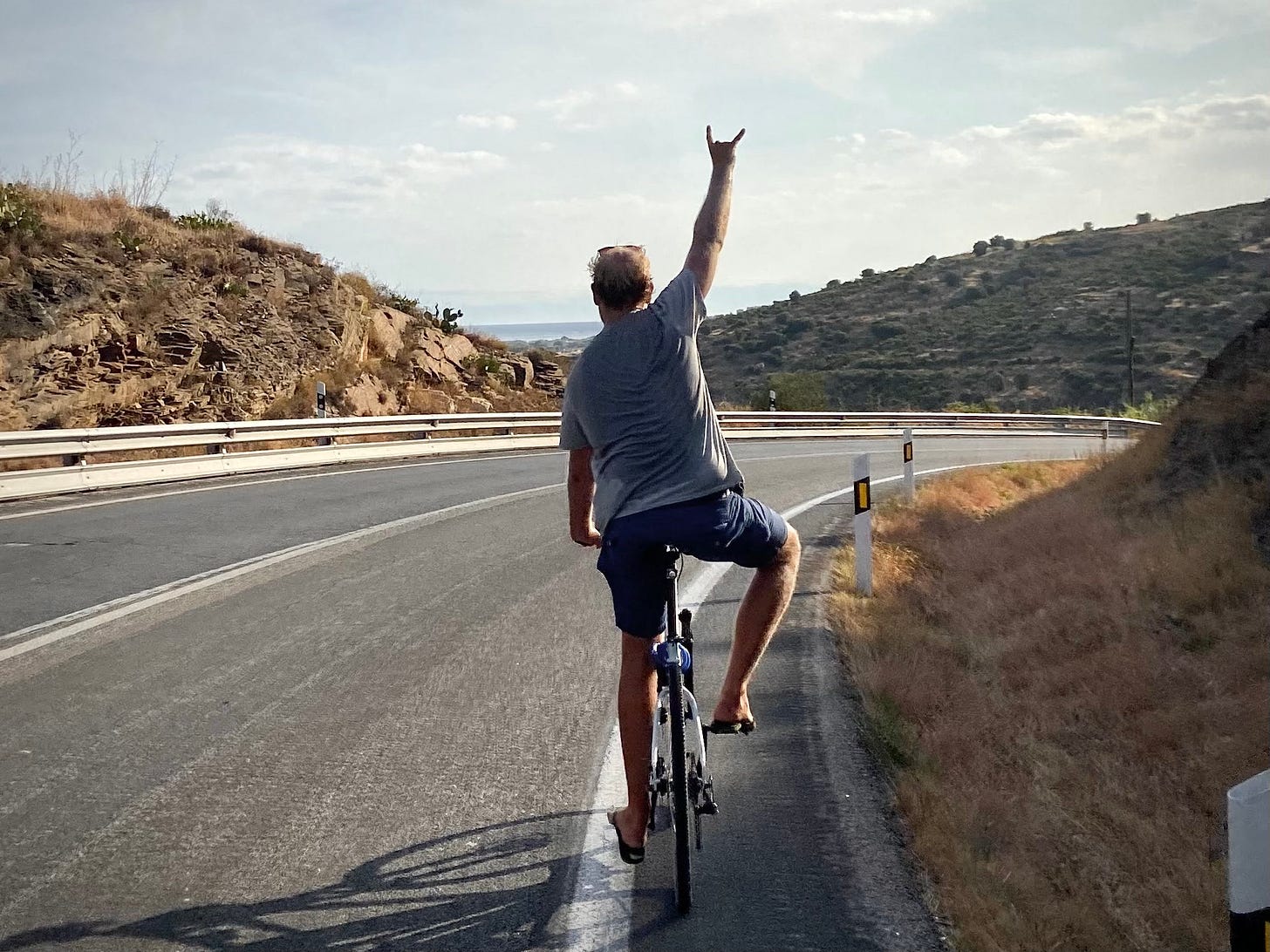
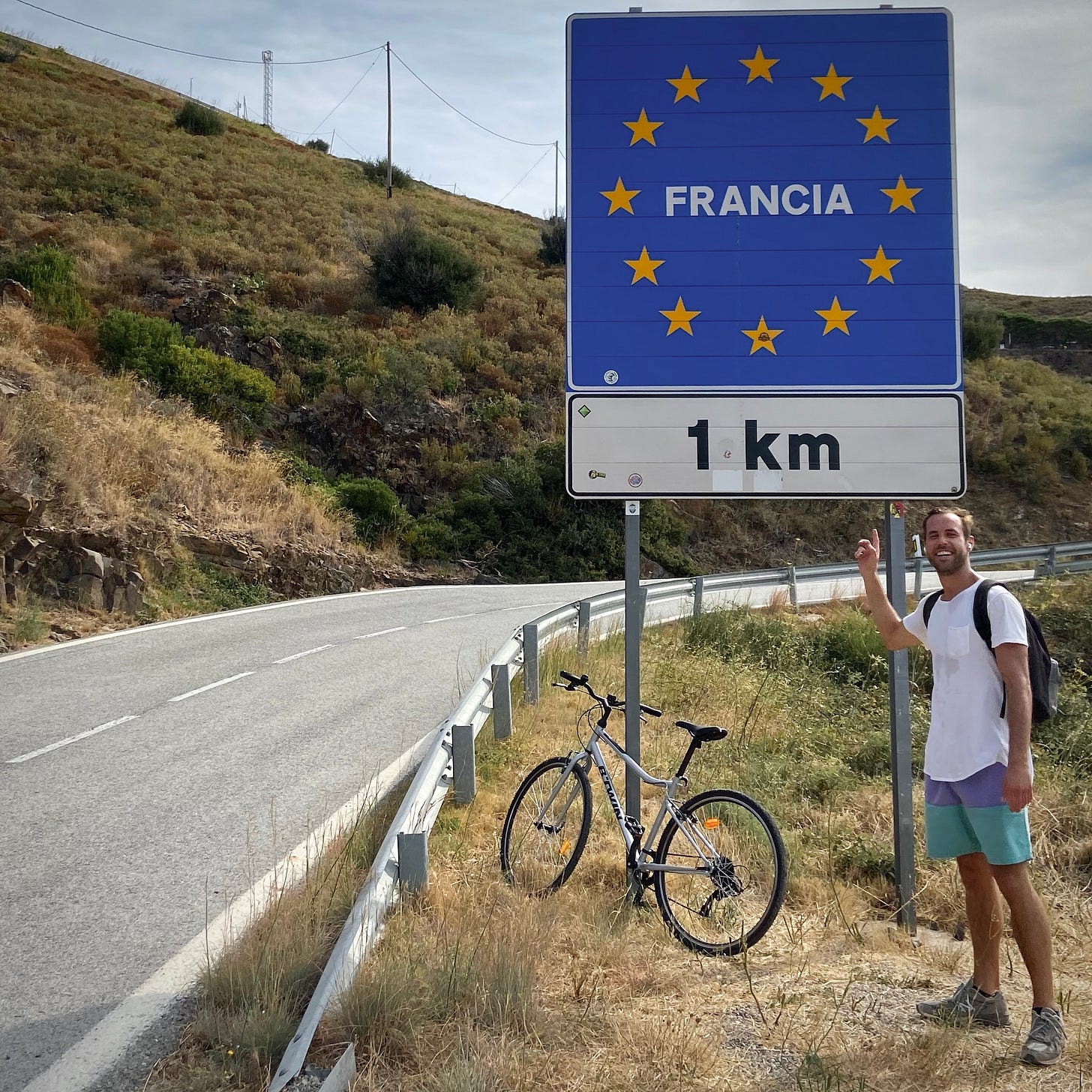

Love how Europe does this and it makes so much sense! America, step it up damnit!
Bravo! I think you've hit the nail on the head with the idea of the collective vacation. Everyone goes on 'ferie' in Italy in August. It's what you do. You swim in the sea. Eat frittura. Drink good white wine and have long dinners with friends. It makes you human. What's the point of 'making more $$$$' if you can't spend time with family and friends?